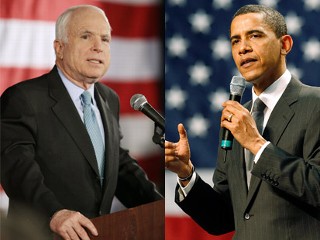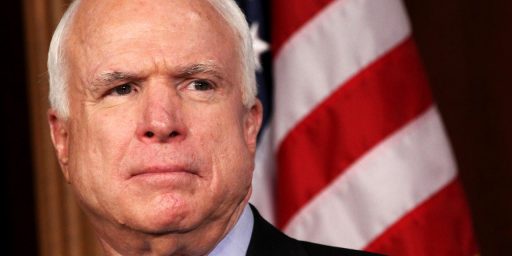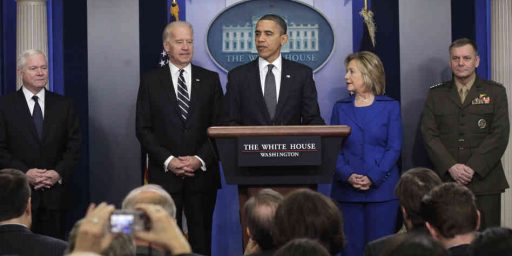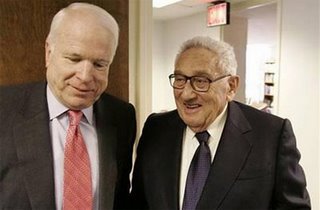McCain and Obama on Iraq and Afghanistan
 William Arkin contends that recent political maneuvering has put Barack Obama and President Bush in almost identical positions vis-Ã -vis Iraq:
William Arkin contends that recent political maneuvering has put Barack Obama and President Bush in almost identical positions vis-Ã -vis Iraq:
The Bush administration’s potential Iraq withdrawal plan, floated in The New York Times over the weekend, to draw down brigades further before September of this year and to accelerate withdrawals in 2009, has collided with Barack Obama’s own 16-month plan, which the candidate recently said needed “refinement.” (It got some clarification today, including his plea to end America’s “single-minded” focus on Iraq.)
Cynics might dismiss the maneuvering as “just politics,” but in fact both men are struggling with the same objective and reality: how to end the Iraq war favorably and without admitting defeat, and how to preserve the honor of the American military.
Scanning summaries of the speeches made today by John McCain and Barack Obama on the Iraq War, I had the same thought. Both are calling for more troops in Afghanistan, for example, extolling the virtues of the Surge, and talking about how to get our troops out of Iraq.
Reading deeper, though, the differences remain stark. While I believe a President McCain would be less be less bellicose than Candidate McCain and a President Obama less diplomatic and accommodating that Candidate Obama — and that we’ll still have a significant but diminished military presence sixteen months into the administration of which ever man wins, they have fundamentally different views of the strategic picture.
The main sound byte from Obama’s speech, “A New Strategy for a New World,” sounded eerily like what I was getting at this morning in my Iraq War Over? We Won? post.
Iraq is not going to be a perfect place, and we don’t have unlimited resources to try to make it one. We are not going to kill every al Qaeda sympathizer, eliminate every trace of Iranian influence, or stand up a flawless democracy before we leave
Reading through the full transcript, however, one sees a very different view. Some excerpts:
[W]e have lost thousands of American lives, spent nearly a trillion dollars, alienated allies and neglected emerging threats — all in the cause of fighting a war for well over five years in a country that had absolutely nothing to do with the 9/11 attacks.
Our men and women in uniform have accomplished every mission we have given them. What’s missing in our debate about Iraq — what has been missing since before the war began — is a discussion of the strategic consequences of Iraq and its dominance of our foreign policy. This war distracts us from every threat that we face and so many opportunities we could seize. This war diminishes our security, our standing in the world, our military, our economy, and the resources that we need to confront the challenges of the 21st century. By any measure, our single-minded and open-ended focus on Iraq is not a sound strategy for keeping America safe.
[…]
In the 18 months since the surge began, the situation in Afghanistan has deteriorated. June was our highest casualty month of the war. The Taliban has been on the offensive, even launching a brazen attack on one of our bases. Al Qaeda has a growing sanctuary in Pakistan. That is a consequence of our current strategy.
In the 18 months since the surge began, as I warned at the outset — Iraq’s leaders have not made the political progress that was the purpose of the surge. They have not invested tens of billions of dollars in oil revenues to rebuild their country. They have not resolved their differences or shaped a new political compact.
To be sure, these points are made in the midst of a foreign policy speech with which John McCain would likely agree on most of the goals. But the two men have a fundamentally different view on the value of the Iraq War.
Let’s turn to McCain’s speech, which announced his “Comprehensive Strategy for Victory in Afghanistan.”
Today we know Senator Obama was wrong. The surge has succeeded. And because of its success, the next President will inherit a situation in Iraq in which America’s enemies are on the run, and our soldiers are beginning to come home. Senator Obama is departing soon on a trip abroad that will include a fact-finding mission to Iraq and Afghanistan. And I note that he is speaking today about his plans for Iraq and Afghanistan before he has even left, before he has talked to General Petraeus, before he has seen the progress in Iraq, and before he has set foot in Afghanistan for the first time. In my experience, fact-finding missions usually work best the other way around: first you assess the facts on the ground, then you present a new strategy.
[…]
Senator Obama will tell you we can’t win in Afghanistan without losing in Iraq. In fact, he has it exactly backwards. It is precisely the success of the surge in Iraq that shows us the way to succeed in Afghanistan. It is by applying the tried and true principles of counter-insurgency used in the surge — which Senator Obama opposed — that we will win in Afghanistan. With the right strategy and the right forces, we can succeed in both Iraq and Afghanistan. I know how to win wars. And if I’m elected President, I will turn around the war in Afghanistan, just as we have turned around the war in Iraq, with a comprehensive strategy for victory.
The two candidate’s strategies for Afghanistan, similarly, are only superficially similar. Both want to increase troop strength by taking forces freed up from drawing down in Iraq. Both think the solution involves more help from our Allies, getting tough with Pakistan, establishing rule of law, and more non-military means. But McCain argues that it’ll take more than that:
But sending more forces, by itself, is not enough to prevail. In the 18 months that Senator Obama has been campaigning for the presidency, the number of NATO forces in Afghanistan has already almost doubled — from 33,000 in January 2007 to about 53,000 today. Yet security has still deteriorated. What we need in Afghanistan is exactly what Gen. Petraeus brought to Iraq: a nationwide civil-military campaign plan that is focused on providing security for the population. Today no such integrated plan exists. When I am commander-in-chief, it will.
Along those lines he makes a very critical point:
One of the reasons there is no comprehensive campaign plan for Afghanistan is because we have violated one of the cardinal rules of any military operation: unity of command. Today there are no less than three different American military combatant commands operating in Afghanistan, as well as NATO, some of whose members have national restrictions on where their troops can go and what they can do. This is no way to run a war. The top commander in Afghanistan needs to be just that: the supreme commander of all coalition forces. As commander-in-chief, I will work with our allies to ensure unity of command.
An important point, indeed.
Photo credit: Getty Images – Reuters – ABC News






Both Sens. McCain and Obama have advocated “getting tough” with Pakistan at one time or another. I think the effectiveness of that view presupposes a central government that’s a lot more in control of the country than Pakistan’s actually is. It is, after all, the only country in the world whose name is an acronym.
I’m also a little skeptical of the effectiveness of an “awakening” strategy for Afghanistan. In a country like Iraq in which most of the people live in cities it’s one thing. Is it the same in Afghanistan?
The interesting thing is that while Obama maintains flexibility, McCain has unfortunately set up a zero-sum game with his Iraq and Afghanistan policies. I don’t see how you can raise the troop levels in Afghanistan without decreasing them by a great deal in Iraq. This seems to be similar to his balance budget proposal where he’s just going to will both places to VICTORY without any evidence to back his pledge up.
Gee, it seems like congress would have investigated what was going on in Afghanistan in the last 18 months. Can anyone remember who chairs the senate committee that would have held hearings on say why an increase in NATO troops hasn’t increased security or why there is divergence of command and restrictions on our allies? Oh that’s right. Obama isn’t about doing something constructive. Obama is about Obama and how to promote Obama.
yetanotherjohn, wouldn’t such hearings be perceived by the Republican’s as attacking and second-guessing the Bush administration’s foreign policy and conduct of the Afghanistan war?
Interesting about the unity of command thing. One might have thought that a senator with military experience who pushed for the surge would have been agitating for that kind of change awhile ago. (Maybe he was, but I haven’t heard of it)
Whether it’s Obama or McCain, the next president needs to declare that it’s “fish or cut bait” time for NATO. The free ride ought to end.